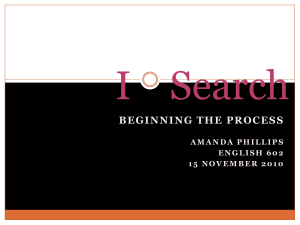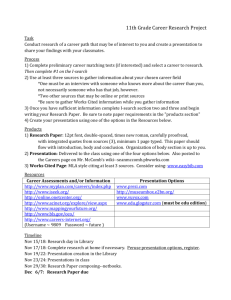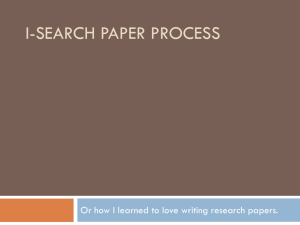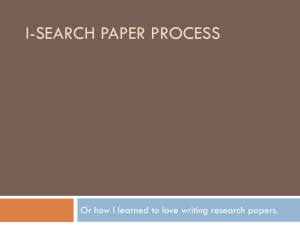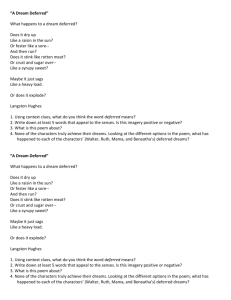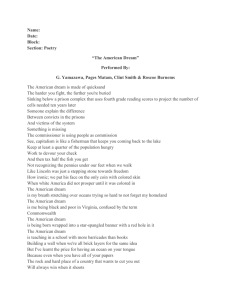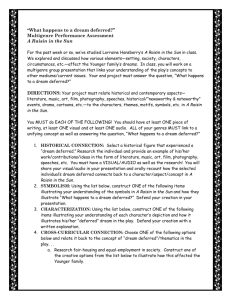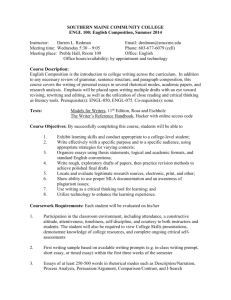Unit 1 Dreams and Goals Time Frame Need for Completion 4 Weeks
advertisement
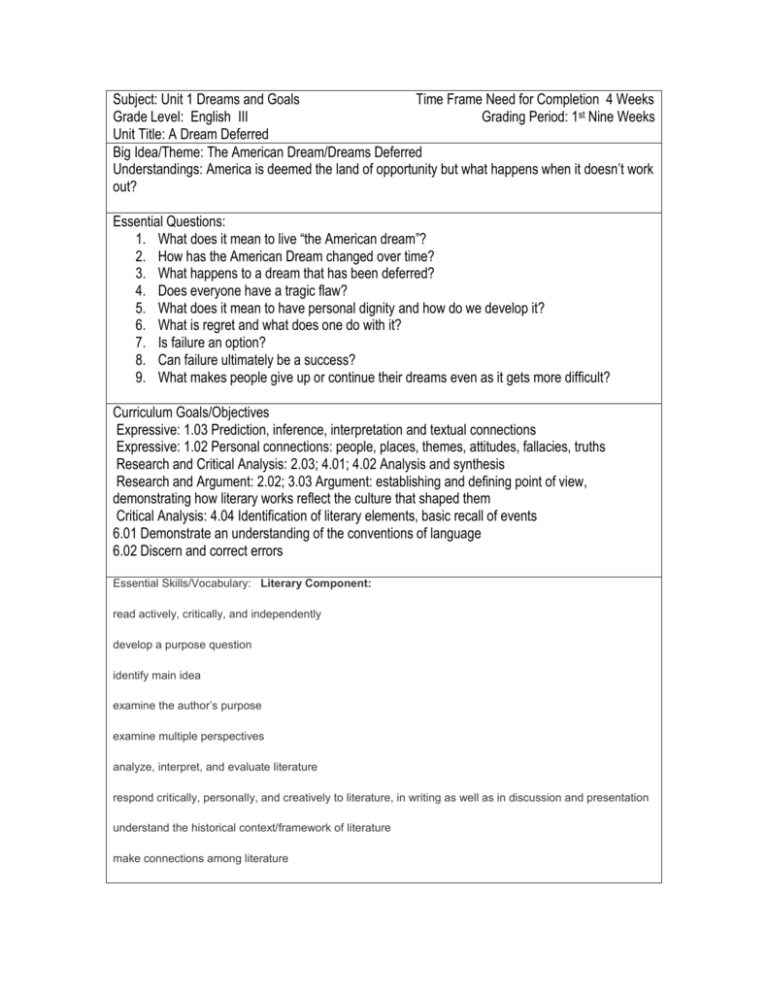
Subject: Unit 1 Dreams and Goals Time Frame Need for Completion 4 Weeks Grade Level: English III Grading Period: 1st Nine Weeks Unit Title: A Dream Deferred Big Idea/Theme: The American Dream/Dreams Deferred Understandings: America is deemed the land of opportunity but what happens when it doesn’t work out? Essential Questions: 1. What does it mean to live “the American dream”? 2. How has the American Dream changed over time? 3. What happens to a dream that has been deferred? 4. Does everyone have a tragic flaw? 5. What does it mean to have personal dignity and how do we develop it? 6. What is regret and what does one do with it? 7. Is failure an option? 8. Can failure ultimately be a success? 9. What makes people give up or continue their dreams even as it gets more difficult? Curriculum Goals/Objectives Expressive: 1.03 Prediction, inference, interpretation and textual connections Expressive: 1.02 Personal connections: people, places, themes, attitudes, fallacies, truths Research and Critical Analysis: 2.03; 4.01; 4.02 Analysis and synthesis Research and Argument: 2.02; 3.03 Argument: establishing and defining point of view, demonstrating how literary works reflect the culture that shaped them Critical Analysis: 4.04 Identification of literary elements, basic recall of events 6.01 Demonstrate an understanding of the conventions of language 6.02 Discern and correct errors Essential Skills/Vocabulary: Literary Component: read actively, critically, and independently develop a purpose question identify main idea examine the author’s purpose examine multiple perspectives analyze, interpret, and evaluate literature respond critically, personally, and creatively to literature, in writing as well as in discussion and presentation understand the historical context/framework of literature make connections among literature Essential Skills/Vocabulary Writing Component: The student should be able to write clearly and effectively in a number of writing contexts (journaling, creative non-fiction) organize thoughts for an effective piece (This I Believe, I-Search paper) write a clear, strong thesis indicative of an argument (This I Believe, I-Search paper) use appropriate evidence to support a thesis (This I Believe, I-Search paper) put evidence in context (in the case of literary criticism) (Higher order thinking questions) write to discover his or her own voice (This I Believe; Philosophical Chairs) Essential Skills/Vocabulary Grammar and Conventions: revision Voice and style, sentence variety, meaning-clarity, tone, standard usage vs. nonstandard subject/verb agreement, phrases and clauses, Assessment Task: 1.03; 1.02; 4.01; 4.02 Authentic Task: Phrase collage (basic recall, making connections); making metaphors; 1.03; 3.03 Cooperative: Philosophical Chairs (suicide); making meaning out of the author’s use of figurative language 1.01 Self Reflection: Quick writes; one pagers, journals 1.01; Written Piece: I-Search (research paper) Intro to: This I Believe essay; peer edit, teacher feedback, revision, final draft 6.01 and 6.02 Conventions and Usage: Subject Verb Agreement and Effective Uses of Phrases and Clauses (essay revision) 4.01; 4.02; 2.03 Reading: synthesizing information; sources; Ban Deodorant Ad Character development 4.03; 6.01 Public Speaking: Drama 1.03; 5.03 Retention of Ideas: C-Notes; essential questions, reflection logs 2.01; 2.02; 2.03 Research: I-Search, sources, parenthetical documentation; Materials Suggestions Text Used: Death of a Salesman A Raisin in the Sun The Great Gatsby The Reluctant Fundamentalist My `Antonia A Dream Deferred A. Miller L. Hansberry F. Scott Fitzerald M. Hamid W. Cather L. Hughes The Art of Racing in the Rain G. Stein Films Used: The Taking of Pelham 1 2 3 John Q The Pursuit of Happyness J. Godey J. Kearnes S. Comrad
